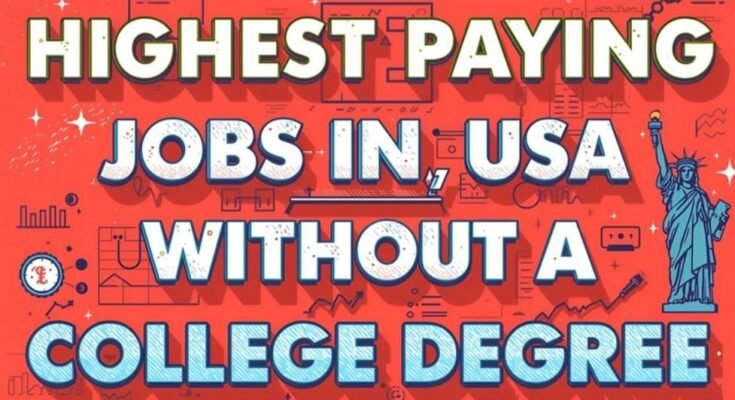Highest Paying Jobs in the USA Without a College Degree
The quest for a lucrative career doesn’t always require university walls. Many high-income jobs in the United States can be accessed through vocational training and skilled trades. These paths do not demand a four-year college degree. This article sheds light on the various ways to achieve financial stability. It celebrates the success of skilled craftspeople, technicians, and service providers who have reached their goals through determination and specialized training.

In today’s job market, success is redefined to include diverse educational paths beyond traditional academia. Job seekers are now looking at industries offering financially rewarding positions. These can be obtained through apprenticeships, on-the-job experience, or vocational schools. Exploring these alternatives to a four-year degree can lead to a career that fits your personal goals and lifestyle, without the debt of college.
Key Takeaways
- Alternative education paths can lead to financially rewarding and satisfying careers.
- Vocational training and skilled trades offer a variety of high-income job opportunities.
- A four-year college degree is not the only avenue to achieve financial success.
- Apprenticeships and on-the-job training are valuable for skill development.
- Financial independence can be attained through industry-specific certifications.
Introduction to Lucrative Careers Without a Degree
In today’s job market, high salary positions are not limited to those with a college degree. The rise of no-degree jobs and well-paid careers as college alternatives is changing the employment landscape. These opportunities offer lucrative options across various industries. They challenge traditional academic paths and provide financial success without college debt.
Many now find that skills from alternative education paths, like online courses and vocational training, are valuable. This shift opens a promising horizon for those seeking stable, rewarding careers without a four-year degree.

The job market evolution shows that practical skills can be as valuable as academic credentials. As industries evolve, so do opportunities for those without formal higher education. Below is a detailed overview of key areas where no-degree jobs are prevalent and well-compensated.
| Industry | Typical Career Paths | Average Salary |
|---|---|---|
| Technology | IT Support, Web Development | $52,000 – $120,000 |
| Sales and Marketing | Digital Marketing, Sales Consultant | $40,000 – $100,000 |
| Skilled Trades | Electrician, Plumber, HVAC Technician | $45,000 – $90,000 |
| Real Estate | Real Estate Agent, Property Manager | $50,000 – $100,000 |
The table above shows a range of careers for those exploring high salary positions without a degree. These careers span diverse fields, each offering respectable earnings. This shift towards inclusive hiring standards shows that financial stability and career satisfaction don’t always require a college degree.
Top Industries for High Paying Jobs Without a Degree
Many aspiring professionals find success without a traditional college degree. The growth of various industries opens doors to well-paying roles that don’t require a four-year degree. These sectors value skills, experience, and certifications over formal education, offering promising career paths.
Technology Sector
The tech industry is booming, driven by innovation and digital transformation. Roles in software development, IT support, and cybersecurity are highly sought after. These positions often demand specific skills or certifications, not a college degree. This makes the tech industry a prime opportunity for those without traditional educational backgrounds.
Healthcare Sector
Healthcare careers have seen significant growth, especially with recent global health challenges. Jobs like medical assistants, pharmacy technicians, and home health aides are essential. These roles typically need short-term training or certificates, making healthcare accessible to those without a degree.
Construction and Manufacturing
Construction and manufacturing jobs are on the rise, driven by infrastructure and production demands. Positions in construction management, welding, and fabrication offer competitive salaries. These roles often require vocational training or apprenticeships, not a formal college degree.
Transportation and Logistics
Logistics careers have become crucial with the growth of e-commerce and global supply chains. Jobs in warehouse management, freight brokerage, and truck operation require specific skills. These are usually acquired through on-the-job training or vocational programs.

Delve deeper into these industries to find career advancement opportunities without a traditional college degree. Each sector offers unique pathways and training programs. These are designed to equip you with the skills needed to thrive in your chosen field.
Impact of Certifications and Trade Schools
In today’s economy, the path to lucrative careers without a college degree often involves professional certificates and practical training. These alternatives provide crucial access to skilled labor markets. Vocational education and apprenticeship programs play transformative roles here.
Professional certifications are vital for meeting and exceeding industry demands. They are developed in partnership with industry leaders. This ensures the training is relevant and respected across the sector.
Importance of Professional Certifications
Certifications are endorsements of specific expertise and competencies in fields like IT, healthcare, and skilled trades. Earning these professional certificates can significantly elevate an individual’s qualifications. It makes them more attractive to potential employers, especially in sectors valuing precision and expertise.
Benefits of Trade Schools and Apprenticeships
Trade schools and apprenticeship programs offer hands-on learning experiences. They are a cornerstone of vocational education. These programs impart practical skills and provide networking opportunities. They facilitate pathways into employment through established connections with potential employers.
How to Choose the Right Certification or Trade School
Selecting the right certification or trade school involves key considerations. Align the program with personal career goals and industry demand. Assess the program’s credibility and outcomes, including graduate success rates and employer partnerships. This ensures a substantial return on investment.
The combined influence of professional certificates, vocational education, skilled labor training, and apprenticeship programs is significant. These educational paths support a robust alternative to traditional four-year degrees. They prepare a skilled workforce ready to meet today’s and tomorrow’s challenges.
Highest Paying Jobs in the USA Without a College Degree
Exploring well-paying jobs without a four-year degree uncovers a range of opportunities. These roles offer not just substantial income but also significant professional satisfaction. They focus on technical skills and on-the-job training, rather than traditional academic paths. This meets the growing demand for practical and applied skills.
In the realm of high-income opportunities, certain positions are particularly noteworthy. They are known for their earning potential and accessibility. Industries like technology, healthcare, and skilled trades are notable for not requiring college degrees. They offer lucrative pay and growth possibilities.
This highlights the effectiveness of alternative educational paths. Paths such as certifications and apprenticeships are just as valuable. They provide a route to success without the need for a traditional college degree.
| Job Title | Average Salary | Industry | Pathway to Entry |
|---|---|---|---|
| Electrician | $56,000 | Construction | Apprenticeship |
| Plumber | $55,000 | Maintenance | Trade School |
| IT Support Specialist | $50,000 | Technology | Certifications |
| Dental Hygienist | $76,000 | Healthcare | Associate Degree |
| Real Estate Agent | $48,000 | Real Estate | Licensing Exam |
The emphasis on skilled professions is growing as the workforce evolves. Understanding these high-income roles and their educational or training requirements is crucial. It helps individuals make informed career choices. This ensures both personal satisfaction and financial stability.
Success Stories: Thriving Without a Four-Year Degree
Exploring success without college reveals a wealth of inspirational stories showcasing notable career achievements. These tales highlight the potential for significant success and effective professional development in non-degree careers. They offer insights into the journeys of individuals who’ve built lucrative careers without traditional academic paths.
Real-Life Examples of High Earners Without Degrees
Several success stories stand out for their impact and motivational value. These individuals have leveraged their skills and experiences to ascend in their industries. They prove that perseverance and aptitude can replace formal education.
Strategies for Success in Non-Degree Careers
To achieve similar success, several strategies are effective. Continuous learning and adapting to industry changes are crucial for ongoing professional development. This keeps one competitive in the job market. Networking is also vital, opening doors to opportunities not available through traditional means.
- Focused skill development in high demand areas
- Building a robust professional network
- Maintaining flexibility and readiness to pivot when necessary
Understanding these strategies and learning from inspirational stories can lead to remarkable career achievements without a formal degree. This path challenges conventional norms and opens new opportunities for success without college.
Advancing in Your Career Without a College Degree
Many believe a college degree is essential for career success. However, it’s possible to grow professionally without one. By focusing on professional networking, mentorship benefits, and skills enhancement, you can thrive in today’s job market. This section will guide you through practical steps to advance your career without the need for a degree.
Networking and Mentorship
Building a strong professional network and securing mentors can revolutionize your career. Professional networking opens doors to new opportunities and boosts your industry knowledge. The mentorship benefits include gaining valuable insights and guidance from experienced professionals.
Continuing Education and Skill Development
To progress in your career without a degree, focus on skills enhancement. Pursue continuing education through certifications, workshops, and online courses. These efforts keep your skills sharp and competitive in a fast-evolving job market.
Utilizing Online Resources for Learning and Advancement
The internet is a wealth of resources for career development without a degree. Online courses and webinars offer practical skills and industry insights. Regularly using these platforms ensures you stay updated with the latest trends.
Financial Planning Without a College Degree
Starting a career without a traditional college degree can be both rewarding and challenging financially. We will explore effective strategies for securing your financial stability. These include smart saving plans, practical investment strategies, and strong personal finance practices.
Managing your finances effectively requires a deep understanding of your spending and how to grow your money wisely. A solid saving plan is the cornerstone of personal finance. It helps you handle emergencies and seize financial opportunities.
- Creating an emergency fund to cover unexpected costs without derailing other financial goals.
- Automating savings to ensure consistency and building wealth over time.
- Reviewing and adjusting budgets monthly to adapt to any financial changes or goals.
When it comes to investment strategies, starting early is key. Even a small initial amount can benefit from compounding interest. It’s vital to diversify your investments to minimize risks and boost potential returns.
- Invest in stocks or mutual funds to yield higher returns by taking calculative risks.
- Consider bonds or fixed deposits for safer, more stable investment options.
- Explore real estate as a long-term investment strategy to build significant equity over time.
By focusing on these fundamental aspects of saving plans and investment strategies, individuals without a college degree can establish a strong financial base. This ensures financial stability and growth, even without the financial support of a college education.
The Role of Gig Economy and Freelancing
The freelance job market has undergone a significant transformation with the rise of the gig economy. This shift has opened up numerous opportunities for those who prefer self-employment. High-paying freelance roles are now available to digital nomads, changing the landscape of professions.
Finding High-Paying Gig Work
To find lucrative gigs in the gig economy, one must understand market demands and possess the right skills. High-paying gigs often reside in tech, creative fields, and business consulting. These roles not only offer financial rewards but also flexibility. This flexibility allows professionals to manage their schedules and work from anywhere.
Building a Freelance Career in High-Demand Fields
- Identify Your Niche: Specializing in areas like digital marketing, graphic design, or web development can make you stand out.
- Enhance Your Skills: Regularly updating your skills keeps you competitive in the freelance market.
- Build a Strong Portfolio: A solid portfolio showcasing your expertise and experience is crucial for attracting clients.
Tools and Resources for Freelancers
- Freelance Management Platforms: Sites like Upwork and Freelancer serve as marketplaces to find and connect with clients.
- Project Management Tools: Tools such as Trello and Asana aid in managing projects, ensuring deadlines are met.
- Financial Management Apps: Apps like QuickBooks and FreshBooks simplify financial tasks, from invoicing to taxes.
By adopting these strategies and tools, freelancers can navigate the gig economy more smoothly. This approach can lead to a successful career in the freelance job market. With the right positioning and resources, digital nomads and freelancers can find self-employment more accessible than ever.
Overcoming Challenges in High-Paying Jobs Without a Degree
Starting a high-paying career without a traditional degree is both challenging and full of opportunities. This part delves into how one can overcome these obstacles. It focuses on personal growth and career hurdles to achieve job stability and a fulfilling career path.
Dealing With Stigma and Stereotypes
Those without a degree often face stigma in the workplace, despite their abilities and experience. It’s vital to overcome this stigma for personal and professional growth. Professionals succeed by demonstrating their skills, building strong professional networks, and keeping their skills up to date.
Navigating Job Market Volatility
Job security is a major concern in today’s dynamic job market. For degree-less individuals, being adaptable and proactive in learning industry trends is key. Embracing flexibility and exploring various opportunities can help manage the risks of job market changes.
The Importance of Soft Skills and Adaptability
Adaptability and soft skills are crucial in overcoming career challenges. Skills like communication, problem-solving, and emotional intelligence distinguish successful individuals in high-paying roles without a degree. These abilities build resilience and adaptability, vital for success in today’s fast-paced work environments.
Conclusion
The job market is constantly changing, showing that a college degree isn’t the only way to find rewarding careers or financial freedom. High-paying jobs exist in fields like technology, healthcare, construction, manufacturing, and logistics. These opportunities offer not just good pay but also a path to self-made success for those with the right skills and drive.
Getting to a successful career without a degree involves ongoing learning and skill-building. This can be done through certifications, trade schools, and apprenticeships. Such efforts not only give individuals specialized knowledge but also demonstrate their commitment to excellence. Networking, mentorship, and using online resources are also key to advancing in one’s career, helping people create their own success stories.
In conclusion, the quest for professional fulfillment is a personal journey, unique to each individual. It demands being proactive in finding opportunities and staying resilient when facing obstacles. For those open to exploring alternative paths, the rewards can be great, leading to a life of financial independence and professional achievement. The unconventional route may be less traveled, but it’s full of potential for those ready to take the leap.



